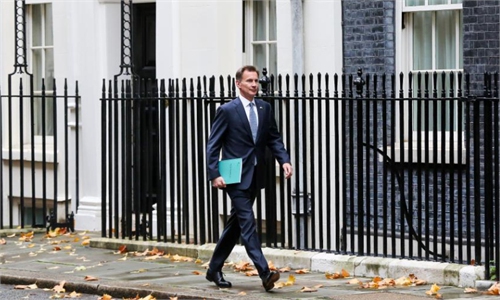
Illustration: Liu Rui/GT
As UK economy in the third quarter slid into recession for the first time since 2008 and inflation surged to a new high in 41 years, a British business leader made another warning on the country's economic predicament after British finance minister Jeremy Hunt's Autumn Statement.Tony Danker, the Confederation of British Industry (CBI)'s director-general, said the Autumn Statement offered no plan to "avoid another decade of low productivity and low growth." The CBI chief suggests the government end Brexit rows and solve worker shortages to boost UK's economic growth, according to British media outlet The Independent.
Coming at a time when the UK's economy is heading into what is expected to be the longest recession on record, Danker's remarks reflect widespread concerns and anxieties among British business community. UK economic policy makers should heed such calls and make careful assessments of the most urgent problems that need to be tackled and the deep structural problems that have plagued the British economy for a protracted period of time.
With the superposition of factors such as the pandemic, a deepening energy crisis, and US interest rate hikes, the UK's economic situation has deteriorated. UK GDP fell 0.2 percent between July and September and is now 0.4 percent smaller than it was at the end of 2019, before the emergence of the COVID-19 pandemic, according to data from the Office for National Statistics released, making it the only G7 economy to have contracted in the third quarter.
The UK's economic woes have exposed the longstanding structural problems including the hollowing-out of real economy industries. The service industry relies on the economic cycle, which means, when the economy grows up, the UK's financial industry, service industry, and high-tech industries can develop, accordingly. Once the economic cycle goes down, the UK's economy will encounter more serious problems.
Another major problem lying under the current predicament of the British economy is its close link to the US economy. When the US Federal Reserve adopts radical monetary tightening of raising interest rates, the British economy will inevitably be impacted. Now, the risk aversion sentiment in the market is suddenly high, and investors are worried about the UK economy due to its close ties with the US. As the US chooses to pay an economic price to solve its high inflation problem, UK has to passively undertake the adverse impacts.
Therefore, the UK's industrial structure and its offshore dollar business will make the UK's financial center overly dependent on the performance of the US dollar. Therefore, there are still many problems in the UK's macroeconomics. As for whether the British government can play a role in getting the British economy out of the current predicament in today's environment, will remain to be observed further.
While some voices in the UK have begun to discuss the economic impacts of Brexit, what lack of discussion is the UK's pan-security of many economic issues. For instance, the UK government recently ordered a Chinese-owned company to unwind its takeover of Britain's chipmaker Newport Wafer Fab, a move that runs completely contrary to the way in which a market economy professes itself to operate.
If the British economy wants to cope with the current crisis, it must stop abusing state power and undermining market economic principles and international economic and trade rules. If the UK cannot provide a fair, just, and non-discriminatory business environment for companies from all over the world, it will be difficult for its economy to get out of the current predicament quickly and achieve a relatively higher growth rate next year.
The author is an editor with the Global Times. bizopinion@globaltimes.com.cn



